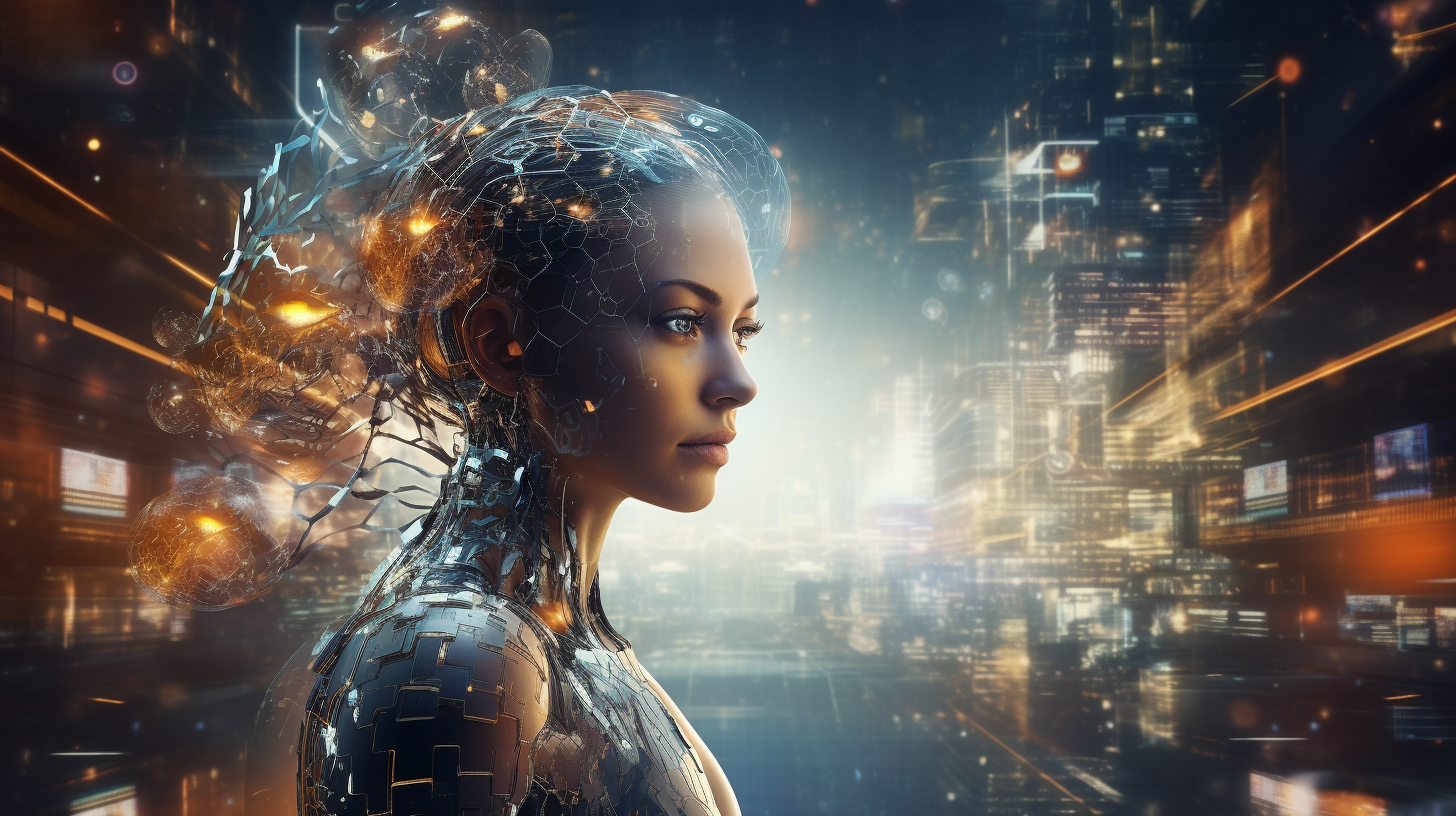Machine learning, AI, and the future of content marketing
July 7, 2023
|
John Thomas
Create higher-quality content that resonates with their target audience through AI-generated marketing content

Just a few years ago, artificial intelligence was a concept most often seen in Hollywood movies and science fiction novels. But in the last decade, AI has become a staple in our everyday lives. From the digital assistants on our smartphones to the self-driving cars on our roads, AI is all around us.
Most businesses have also adopted AI, such as chatbots to communicate with customers better. Marketing is no different. In fact, many believe that AI will profoundly impact marketing in the years to come.
One of the most significant subsets of artificial intelligence, machine learning, is integral to how AI works.
What is machine learning?
Machine learning is a branch of AI that teaches computers to learn from data and make predictions. If that sounds like becoming sentient and taking over the world à la Terminator, don’t worry—it’s not quite that advanced yet. However, we can draw parallels between how machine learning works and how humans learn.
Say, for example, you’re trying to teach a child how to identify animals. You could show them pictures of animals, tell them what each one is called, and which family it belongs to. The information will be “stored” inside the child’s brain, and over time, they’ll be able to recognize the animals they learned about. Even if they see a picture of an animal they’ve never seen before, they’ll be able to classify it based on what they know.
With machine learning, we give computers similar training. We can take a large dataset and train a machine-learning algorithm on it. The algorithm will learn from the data and, eventually, be able to make predictions about new data. A neural network, in some ways the machine’s “brain,” is what makes this possible.
The neural network is inspired by the way our brains work. It comprises a series of interconnected nodes that each perform a simple task. The output of one node becomes the input for the next, and so on. The more nodes there are, the more complex the tasks can be.
Think of each node as a piece of information and the connections between them as the relationships between those pieces of information. The neural network will learn to recognize patterns in the data by forming these connections.
As you can see, machine learning is a pretty complex field, mainly studied by mathematicians, statisticians, and computer scientists. Its application in modern marketing is also proven.

Machine learning in content marketing
So, how do these complex mathematical models and algorithms translate to content marketing? In short, machine learning has been packaged into a number of marketing software solutions that aim to make it easier to get your business in front of the right audience.
Here are some examples of where you might see machine learning being used in content marketing:
AI content creation
Perhaps the most obvious application of machine learning in content marketing is written content writing. Several startups have developed software that can generate written content for you, and they’re getting quite good at it. By using natural language processing (NLP), these tools understand the context of a piece of text and generate new content that’s relevant.
Typically, these tools leverage OpenAI technology. AI content generators can create high-quality content for you, including blog posts, social media posts, and even ad copy. All you need to do is provide a prompt, and the tool will use its NLP capabilities to develop something new.
AI copywriters use machine learning to improve their content over time. The more data it has to work with, the better it becomes at understanding tone of voice and style. The specific neural network machine learning model is called Generative Pre-trained Transformer 3 (GPT-3). GPT-3 is a state-of-the-art NLP model that many consider the gold standard in language generation today.
Before you get started, check out our tenets for using AI for content creation.
Visual content creation
In addition to written content, companies can also use machine learning to create visual content. Many tools use NLP to generate visuals. DALL-E is one such tool. Created by OpenAI, DALL-E is an AI program that can generate images from textual descriptions.
To use DALL-E, you simply type in a description of what you want the image to be, and the AI creates something that matches your description. It essentially understands the relationship between the words in your description and creates an image based on that.
For example, if you type “a cat swimming in money,” DALL-E will generate variations of images of exactly that.
While Jasper works word-by-word, DALL-E is something similar to pixel-by-pixel. Based on its dataset of images, DALL-E can understand the relationships between images and generate original images that match the description it’s given.
Customer support
Another area where we can use machine learning in content marketing is customer support. Responding to customer questions and queries can be a time-consuming process, but there are AI-powered chatbots that can do it for you.
Chatbots are computer programs that can mimic human conversation. They’re powered by NLP and can understand the context of a conversation to generate meaningful responses. In fact, Eugene Goostman, a chatbot created in 2001, passed the Turing test successfully. This test, developed by Alan Turing in 1950, determines whether a computer is capable of fooling a human into thinking it’s also human.
While chatbots have been around for a while, they’ve gotten much better in recent years thanks to advances in machine learning. Chatbots that use machine learning can learn from their conversations and improve over time. They’ll develop better problem-solving skills and be better equipped to handle customer queries.
Research
Finally, machine learning can be used in content marketing for research purposes. Several tools use machine learning to help you gather data and insights. From keyword research to competitive analysis, these tools can make your life a lot easier. The algorithms can be programmed to scour the web for specific information and compile it into an easily digestible format.
This use case is varied and vast, but every instance will have the same end goal: Look at the past and predict the future.

The benefits of machine learning for content marketing
Machine learning is already impacting the world of content marketing in a big way. And as machine learning technology continues to evolve, the ways in which it can be used will only proliferate. Here are some of the benefits of using machine learning for content marketing:
Lower costs
In many cases, AI allows companies to operate with fewer employees. For example, a company that uses a chatbot to handle customer queries doesn’t need to hire as many customer service representatives. And a company that uses machine learning for content generation can get by with fewer content creators.
In addition to lower labor costs, machine learning can also help content marketers save on production costs. For example, if you use a tool like DALL-E to generate visuals, you won’t need to pay for costly stock photos.
Increased output
Without writer’s block, lack of motivation, or fatigue, machines complete tasks much faster than humans. That means you can produce more content in a shorter period of time when you use machine learning. From blog posts to email newsletters, you can churn out a lot of content quickly and easily.
Big data analytics
Many companies are sitting on a goldmine of data but don’t have the resources to make sense of it all. Machine learning is the only way to analyze large data sets effectively. With machine learning, you can draw insights from your data that you wouldn’t be able to get using traditional methods.
From competitor analysis to customer segmentation, machine learning can help you understand your data in ways that weren’t possible before. This is valuable for content marketing because it allows you to understand your audience better and produce content that’s more likely to resonate with them.
You can also use machine learning to track the performance of your content and make data-driven decisions about what to produce next.
Improved targeting and personalization
Following the previous point, because machine learning allows you to better understand your audience, you can also use it to target them more effectively. You can segment your audience and create content specifically tailored to their needs and interests.
In addition, you can use machine learning to personalize content for individual readers. This feature is possible because machine learning can track the behavior of individual users and understand what kinds of content they’re interested in. With this information, you can serve up personalized content that will likely be clicked on and read.
The Future of machine learning and AI in content marketing
The future of machine learning and AI in content marketing is bright. As this technology continues to evolve, so too will the ways in which it can be used. We’re already seeing several exciting applications for machine learning and AI in content marketing, and there are sure to be many more in the years to come.
Mass adoption has already begun, with more and more companies using machine learning and AI to create better content. In the future, we’ll see more widespread use of these technologies as they become increasingly affordable and easy to use.
If you haven’t already started using machine learning and AI in your content marketing, now is the time to get on board. These technologies can help you save money, increase output, and better understand your audience. With so much to gain, there’s no reason not to start using them today.



